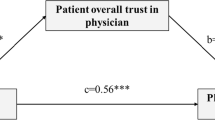Abstract
Disclosure of the diagnosis of cancer to patients is a difficult task for physicians in developing countries. Family members often oppose truth telling. The aim of this study was to evaluate the incidence of the “do not tell” attitude in a general population of cancer patients and to explore the factors affecting the attitude of cancer patients’ relatives about honest disclosure. Using a questionnaire, relatives of 150 patients with recently diagnosed cancer were interviewed. Of the relatives, 66% did not want the diagnosis to be disclosed. Male gender of the patient, a diagnosis of a non-breast cancer malignancy, the presence of stage IV disease, no previous request for disclosure by the patient, insufficient knowledge of the relative about cancer in general, and stronger religious belief of the relative were associated with greater likelihood of the relative having a “do not tell” attitude in univariate analyses (P=0.032, P=0.000, P=0.051, P=0.021, P=0.128, and P=0.058, respectively). In a multivariate analysis, the diagnosis of a non-breast cancer malignancy, and insufficient knowledge of the relative about cancer in general retained their significance (exp(B)=14.77, P=0.000; exp(B)=3.04, P=0.01, respectively). Differences among different countries and cultures are discussed.


Similar content being viewed by others
References
Butow PN, Tattersall MH, Goldstein D (1997) Communication with cancer patients in culturally diverse societies. Ann N Y Acad Sci 809:317–329
Bozcuk H, Erdoğan V, Eken C, Çıplak E, Samur M, Özdoğan M, Savaş B (2002) Does awareness of the diagnosis make any difference in quality of life? Determinants of emotional functioning in a group of cancer patients in Turkey. Support Care Cancer 10:51–57
Thomsen OO, Wulff HR, Martin A, Singer PA (1993) What do gastroenterologists in Europe tell cancer patients? Lancet 341:473–476
Baile WF, Buckman R, Lenzi R, Glober G, Beale EA, Kudelka AP (2000) SPIKES-A six-step protocol for delivering bad news: application to the patient with cancer. Oncologist 5:302–311
Ali NS, Khalil HZ, Yousef W (1993) A comparison of American and Egyptian cancer patients’ attitudes and unmet needs. Cancer Nurs 16:193–203
Hu WY, Chiu TY, Chuang RB, Chen CY (2002) Solving family-related barriers to truthfulness in cases of terminal cancer in Taiwan. A professional perspective. Cancer Nurs 25:486–492
Butow PN, Maclean M, Dunn SM, Tattersall MH, Boyer MJ (1997) The dynamics of change: cancer patients’ preferences for information, involvement and support. Ann Oncol 8:857–863
Younge D, Moreau P, Ezzat A, Gray A (1997) Communicating with cancer patients in Saudi Arabia. Ann N Y Acad Sci 809:309–316
Mystakidou K, Liossi C, Vlachos L, Papadimitriou J (1996) Disclosure of diagnostic information to cancer patients in Greece. Palliat Med 10:195–200
Loge JH, Kaasa S, Ekeberg O, Falkum E, Hytten K (1996) Attitudes toward informing the cancer patient—a survey of Norwegian physicians. Eur J Cancer 32A:1344–1348
Grassi L, Giraldi T, Messina EG, Magnani K, Valle E, Cartei G (2000) Physicians’ attitudes to and problems with truth-telling to cancer patients. Support Care Cancer 8:40–45
Noone I, Crowe M, Pillay I, O’Keeffe ST (2000) Telling the truth about cancer: views of elderly patients and their relatives. Ir Med J 93:104–105
Meredith C, Symonds P, Webster L, Lamont D, Pyper E, Gillis CR, Fallowfield L (1996) Information needs of cancer patients in west Scotland: cross sectional survey of patients’ views. BMJ 313:724–726
Leydon GM, Boulton M, Moynihan C, Jones A, Mossman J, Boudioni M, McPherson K (2000) Cancer patients’ information needs and information seeking behaviour: in depth interview study. BMJ 320:909–913
Merrouche Y, Freyer G, Saltel P, Rebattu P (1996) Quality of final care for terminal cancer patients in a comprehensive cancer centre from the point of view of patients’ families. Support Care Cancer 4:163–168
Sen M (1997) Communication with cancer patients: the influence of age, gender, education and health insurance status. Ann N Y Acad Sci 809:514–524
Eraker SA, Kirscht JP, Becker MH (1984) Understanding and improving patient compliance. Ann Intern Med 100:258–268
Stewart MA (1995) Effective physician-patient communication and health outcomes: a review. CMAJ 152:1423–1433
Friedrichsen MJ, Strang PM, Carlsson ME (2001) Receiving bad news: experiences of family members. J Palliat Care 17:241–247
Ringdal GI, Jordhoy MS, Kaasa S (2002) Family satisfaction with end-of-life care for cancer patients in a cluster randomized trial. J Pain Symptom Manage 24:53–63
Ringdal GI, Jordhoy MS, Kaasa S (2003) Measuring quality of palliative care: psychometric properties of the FAMCARE scale. Qual Life Res 12:167–176
Author information
Authors and Affiliations
Corresponding author
Rights and permissions
About this article
Cite this article
Ozdogan, M., Samur, M., Bozcuk, H.S. et al. “Do not tell”: what factors affect relatives’ attitudes to honest disclosure of diagnosis to cancer patients?. Support Care Cancer 12, 497–502 (2004). https://doi.org/10.1007/s00520-004-0633-2
Received:
Accepted:
Published:
Issue Date:
DOI: https://doi.org/10.1007/s00520-004-0633-2




